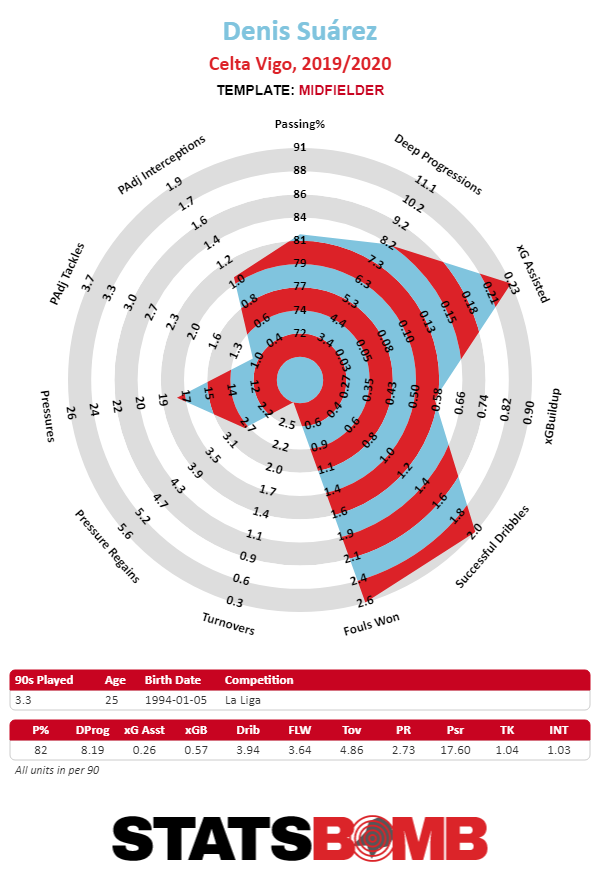Celta’s Plan A in recent years was simple; get the ball to Iago Aspas. Plan B was to make sure Plan A didn’t get injured. Having lost Daniel Wass and Maxi Gomez in recent seasons, Celta knew they had to not only reinvest in the squad but reinvent themselves to become more anti-fragile. Relying on one excitable talent is not a sustainable strategy.
Felipe Miñambres, who worked wonders with Rayo Vallecano during their longest ever spell in La Liga before leaving for Vigo, has done some of the most significant work in all of European football this summer. He has identified players who can play in Fran Escriba’s preferred system — 4-4-2 — and built a side which is likely to be one of the best teams to watch in Spain. After three games, Denis Suárez has been a key to the newly revitalized team.
Suárez was convinced that he would make it at Barcelona. There was the sense that if he left the club, regardless of where he went, he would never have it as good and that his chance to fulfill early promise would never return. Obsession can be good for elite athletes and most of them have something compulsive that drives them to be the best but when your own ambition is holding you back from realising your potential, you need to take stock. Suarez did just that and he eventually left Barcelona but only after Frenkie de Jong arrived and his hopes of game time were slashed even further. With Valencia and other clubs in for his signature, he made the more sentimental choice by moving back to Celta, the team where he spent his youth.
He has played 270 minutes so far this season, which is more than he managed in six months at Arsenal and the previous six at Barcelona combined. He’s almost half way to his total in La Liga from two years ago too. Celta and Escriba trust Suárez to be a catalyst in midfield and he is already repaying the faith they have shown in him.
Celta Vigo have one of the freshest, most vibrant, young midfields in La Liga. Fran Beltrán is still a kid. Stan Lobotka is not much older and Brais Mendez is on track to become one of the finest central midfielders in Europe. Adding Suárez was meant to keep the age down, inject some hometown talent and a player for the fans to get behind, add a dash of dribbling ability from the left and a sprinkle of playmaking too. He was meant to be an ancillary piece. Instead, he has become the fulcrum of the team, the link between midfield and attack, the man that unbalances opposition and the man who should make it a lot easier for Iago Aspas to find space to do damage.
That was the whole idea after all. Celta's big task was either replacing Maxi Gomez or rebuilding the team so he wasn't missed. They replaced him with a man named Gabriel ‘The Bull' Fernandez but Gomez’ ability to create a black hole around him into which defenders seemed to disappear is second to none. The now-Valencia striker was the perfect remedy to teams keying in on Aspas. In his 75 games with Celta, he scored 31 goals. But he needed Aspas as much as Aspas was helped by him as the pair worked well together and not as effectively alone. Simply put, the centre was never going to hold for Celta with such a reliance on the health of such a small fraction of their team.
The signing of Suárez, along with a loan deal for Rafinha, has completely changed the midfield and given Fran Escriba, a loyal purveyor of the 4-4-2, options in his midfield and attack. There are no classic wingers in the team with Pione Sisto, a player whose star looked to be rising, shunted to the bench in favour of Suarez and only used now as a change of pace and when all other avenues of progress have been exhausted. Sofiane Boufal, a player who left you more frustrated than satisfied after watching him play, has left for Southampton. Riyad Boudebouz was also tried as the left midfielder when Escriba took over and Emre More too but they never fit and have both moved on too.
Occupying a space on the left, Suárez is willing to drop deep, roam into central positions and join the attack as a versatile and technically excellent midfielder. His 13 successful dribbles is twice as many as anybody else on the team.
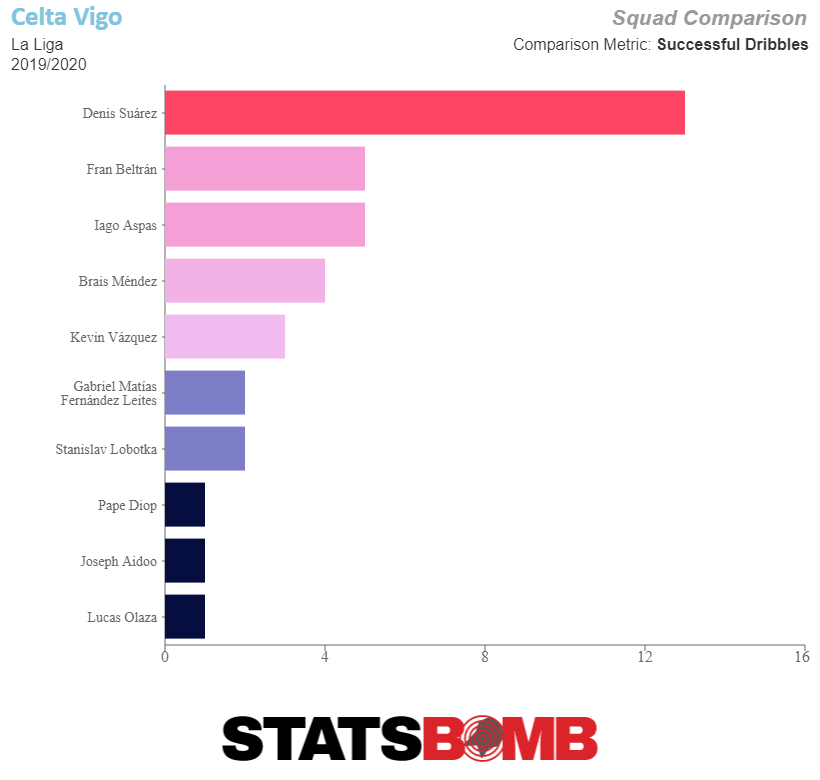
He’s also the team’s most important ball progressor and his 27 deep progressions make him Celta’s most frequent engine to get the ball into the attacking zone.
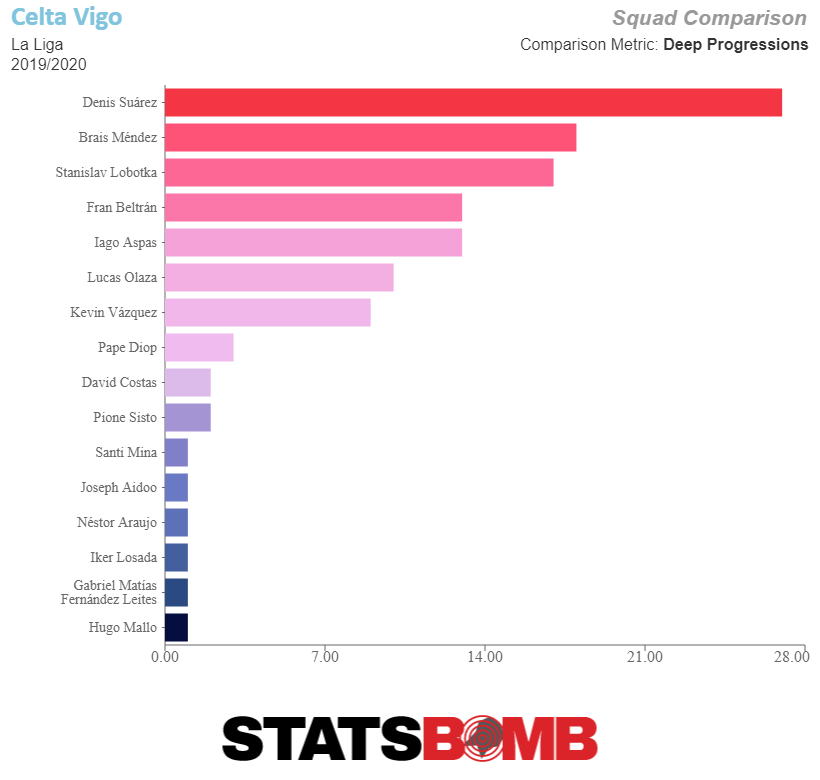
There’s an argument to be made, and a very strong one at that, that Denis Suárez has been the most influential midfielder through three games in La Liga. Although with so few games played it’s unwise to project his performances forward, what he’s accomplished in the young season is remarkable. Those 13 successful dribbles work out to 3.94 per 90 minutes, the second most of any player with 200 minutes played. The deep progressions work out to 8,19 per 90, 14th in the league (though if you’d like to see an example of how early numbers skew things, four of the top five ball progressors in La Liga at this point play for Barcelona). And finally his 0.26 expected goals assisted per 90 is the third best total at this early point in the season. The fixture-makers have not been kind to them either. They have already played Real Madrid, a game in which he excelled as Celta’s most dangerous attacker despite the team’s 1-3 loss.
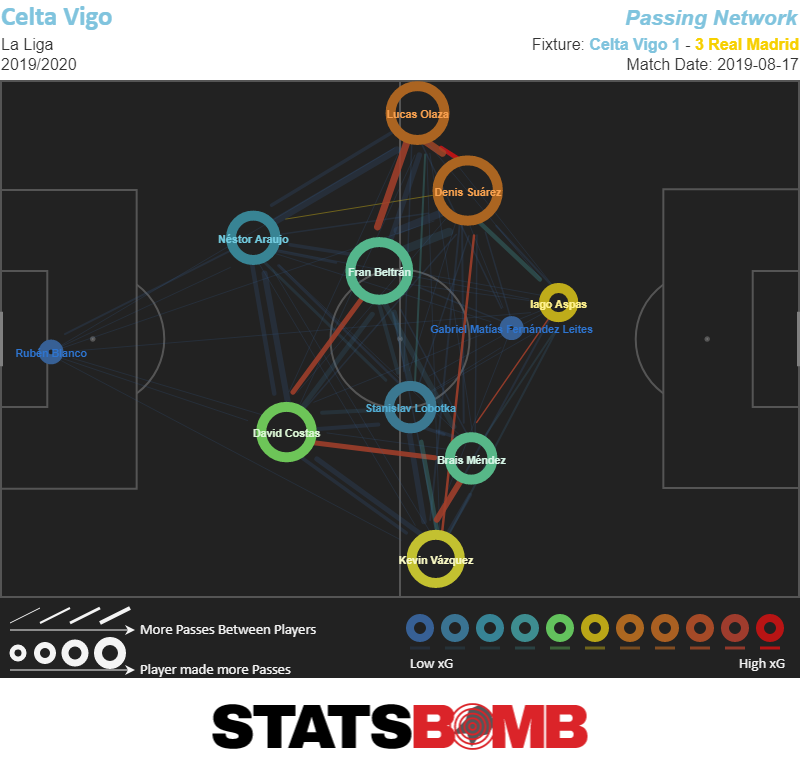
He starred against Valencia, a game in which he was man of the match, and converted the stoppage time penalty to win the game, and Sevilla, a game in which he scored the equaliser after Celta had created literally nothing for the better part of 85 minutes.
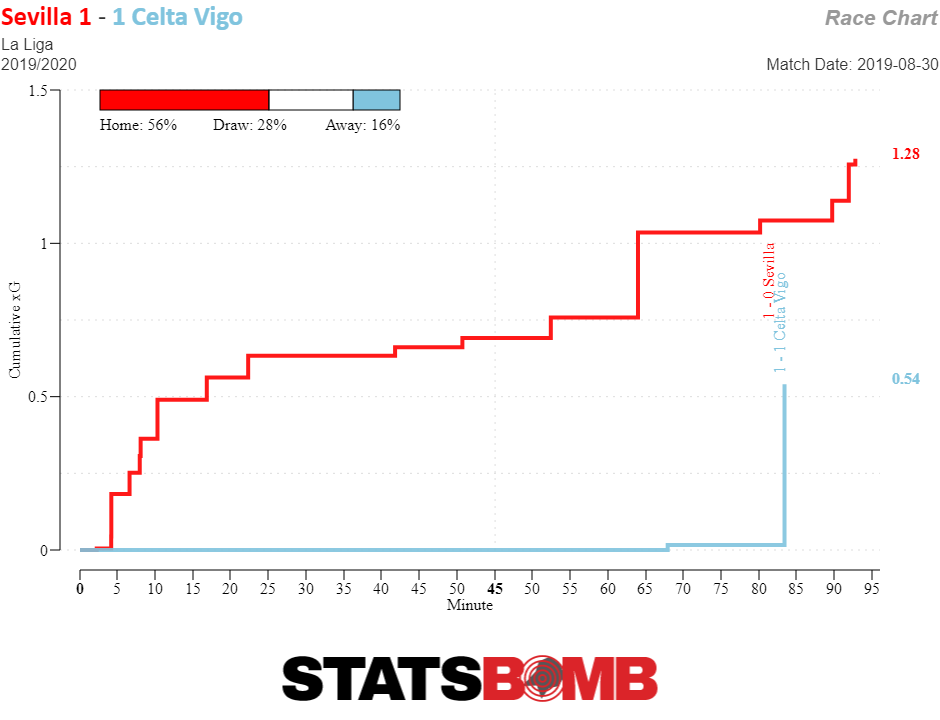
Naturally those two goals have been drawing the attention, but they are are also the only two shots he has taken this season. It has been the rest of his play, the creativity both to move the ball up the pitch and in the final third that has really set Suárez apart.
With no number 10 to focus on, Celta have to bypass midfield, meaning Suárez and Mendez on the wings are both controllers of the game and the main source of creativity with Aspas playing off the main striker. The scope of their roles is broad, their ability to fulfill their remit has been faultless to far.
Fran Escriba has rattled a tune out of his several new players early on. He has to integrate Rafinha into the fold now too and is yet to find a place for Santi Mina, another versatile Vigo-born player. Aspas, who is now 32, was being held together with matchsticks by the end of last season as he helped them stave off relegation. He can rest assured that this season there are enough players around him that will lighten his load so he can be decisive late in the season and late in games when they are likely to need him most.
